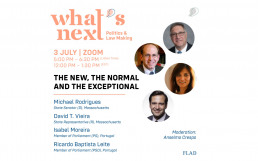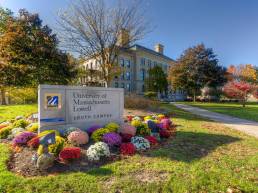How are Parliaments and legislators responding to COVID-19? What measures have been taken, or can be taken, to support society at this difficult time?
The Webinar “What’s next for Politics and Lawmaking: the new, the normal and exceptional” brought together last Friday, under the moderation of journalist Anselmo Crespo, two Portuguese deputies from different parliamentary groups (PS and PSD) and two U.S. legislators, of Portuguese descent, from the State of Massachusetts, also elected by different parties.

Isabel Moreira, deputy of the Socialist Party, Ricardo Baptista Leite, deputy of the PSD, Michael Rodrigues, Democrat State Senator for the Massachusetts Congress, and David Vieira, Republican State Representative for the Massachusetts House of Representatives, came together to discuss the role of parliaments at this exceptional time in which we live.
The importance of political consensus in exceptional times such as those we live in has been recognized by all speakers, regardless of their party affiliation. These consensuses, they argue, exist both in Portugal and in the Massachusetts State House, the seat of the legislative power of that State.
Another aspect under discussion was the importance of the Media and Communication services, both from the point of view of the coherence between what is requested and what is done and from the point of view of the right of citizens to be informed. Legislators called for the need to contextualize information in order to manage the fear and panic of those who receive it so often.
Isabel Moreira, member of the Socialist Party, also highlighted the role of parliaments in the scrutiny of government action and, described the use of the state of emergency as a traumatic experience for the whole country, recognizing, nevertheless, how this is a sign of democratic vitality.
“It was a moment of trauma. (…) But at the same time, it was a good moment (…). [The State of Emergency] is predicted precisely to defend our rights (…). It is the democratic way to defend our rights”.
David T. Vieira cited the case of an exceptional law, with a strong impact on the housing market, which had to be passed in Massachusetts to prevent evictions during the crisis, necessary to balance property rights with the safety and health of citizens. The adoption of this and other legislative proposals was the result of a compromise between the parties.
“To show a united front. To show our constituents (…) that we are working together even though we disagree on many political points, that we are working together to address the crisis on their behalf”.
Michael Rodrigues pointed out, particularly how, in a Democratic majority context in the State House with a Republican governor, the partisan consensus extended to relations between legislators and the executive, also concerning the reopening of the economy.
“We will reopen based upon the public health metrics, not based upon the calendar.”
Ricardo Baptista Leite, deputy of the PSD, warned for the need to be prepared, on several fronts, either for a second wave or for a new pandemic. And to ensure that the damage to the economy is as small as possible, he advocated the implementation of a control system, with mandatory quarantine for people who have been in contact with someone infected with the coronavirus.
“We need to reconquer their confidence [of the United Kingdom]. And to reconquer the confidence, we need to do what needs to be done internally in terms of controlling the system.”
Don’t miss this Thursday, July 9, at 6:00 PM, our next webinar dedicated to the response of higher education institutions to the COVID-19 pandemic and the consequences that resulted from this crisis for Education.
Participation is free of charge. Just sign up via the following link: https://zoom.us/webinar/register/6815937846301/WN_HTHweeWjQdyT4z_RKgx6DQ
See you soon!
Related Posts
23 de July, 2024
Inês Thomas Almeida next FLAD/Saab Visiting Professor at UMass Lowell
Musicologist, she holds a PhD in…
3 de July, 2024
B+S Bispo D. Manuel Ferreira Cabral School, from Madeira, wins Atlântico Junior Award
Students win with a project to create…



